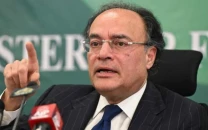Money keeps bureaucrats from going round

Money keeps bureaucrats from going round
He was issuing an extension order for a bureaucrat during his time as the Prime Minister of Pakistan.
Members of Bhutto’s political party, once again in power, are ignoring the government’s rotation policy for the Ministry of Finance, religiously following their leader’s orders, three decades later.
Government officers serving in the finance ministry are seemingly exempted from the government’s rotation policy, according to what The Express Tribune has learned.
They are supposed to be rotated at the time of promotion of grade 20. But for reasons best known to the Establishment Division, the body responsible for their rotation, the officers serving in the Finance Ministry have been exempted from transfer to any other division, ministry or province.
The ones that joined at grade 17 entry level grade 17 positions as section officers are now serving at considerably higher posts of joint secretary’s grade 20 and 21 without serving their mandatory rotation period as required by the law.
The law states that officers are supposed to be rotated to other divisions or ministries at various stages in their career.
According to the Esta civil establishment codes “a District Management Group (DMG) and Police Service of Pakistan (PSP) officer shall be liable to serve in at least two provinces as well as in the Federal Government during his career.”
Samira K. Aslam, for instance, joined the finance ministry as an Assistant Financial Analyst in Grade 17 and was later promoted to the Joint Secretary of Investment in the same ministry. Similarly, Iqbal Awan, the Additional Secretary Corporate Finance, who belongs to the accounts division and is on deputation, has been serving in the ministry for more than two decades.
On the other hand, Mian Mohammad Younis fulfils dual roles as a public officer. He has been serving as an Additional Secretary Provincial Finance and Administration in the same office for almost 20 years.
Another officer, Nazrut Bashir, joined the ministry as a Deputy Secretary and was later appointed as an Additional Secretary. None of these officers have been rotated.
Learning Process
The idea behind the rotation policy is to provide officers with a well rounded knowledge of various department divisions within the ministry and to offer them learning opportunities during their posting to other areas. This experience is then given due weight when an officer is promoted to Grade-20.
In the Finance ministry’s case, however, officers have succeeded in establishing a monopoly and are rather pleased that they do not have to avail this opportunity.
Talib Baluch’s tenure as Joint Secretary Budget was extended without going through the proper channels and in violation of the policy say officals. Baluch had joined the Ministry as a Section Officer and retired as a Deputy Secretary while holding the additional charge of Joint Secretary Budget.
What should have happened is that he should have been rehired as Deputy Secretary then he should have been given an extension after which he should have been given the responsibility of the Joint Secretary Budget. But Baluch was given an extension even without having been returned to his parent division.
The government had high hopes that the initiated Project for Improvement in Financial Reporting and Auditing (PIFRA) project would help improve financial management and ultimately discourage the financial monopoly of a few officers.
A glance at the fiscal operation summary of the Ministry of Finance shows how billions of rupees have been spent as “un-booked expenditure.”
Budget and PIFRA coordinator, Nasrul Aziz, joined the ministry in 1980s. He retired around seven years ago and is still considered indispensable. He was offered his previous post and rejoined the ministry.
His brother Mazrul Aziz who is also a retired officer, rejoined the ministry as Section Officer Admin IV.
It is apparent that the government is deliberately ignoring a tried and tested policy in the case of the finance ministry, fearing that trying to enforce the rotation policy in this case would prove to be counterproductive rather than helpful.
As a result, all the people who have an extensive experience of working in the ministry have been retained by offers of a post-retirement job.
Experts Differ
In the opinion of former Governor State Bank of Pakistan and head of the Pay and Pension Commission, Dr Ishrat Hussain, who is against on-job rotations, if this policy is applied in the case of finance ministry then it should be confined to rotation within the economic ministries.
But there are others who disagree. A former secretary of privatization, who has also served in the Finance Ministry, says that an officer who is on extension cannot hold a current charge in the ministry.
He said that a major problem with officers in the ministry is that they refuse to pass on crucial information to their subordinates and ultimately become indispensable.
He added that there is no budget manual in the finance ministry either and the task is performed by a handful of individuals in the ministry. Taking them out would lead to a lot of problems and mismanagement in the budget making process.
Others have even accused the current bosses in the finance ministry of promoting nepotism and favouritism, which, they allege, has resulted in financial indiscipline and mismanaged public accounts.
It has also been alleged that most public servants, from the Budget Coordinator to the Special Secretary of Finance, spend their official hours either indulging in vendettas or protecting each other’s interests. Asif Bajwa, Special Secretary Finance, who entered the Q-block in 1980s, is now said to be the center of the command structure. He is alleged to have formed a group of his favourites and it is generally believed that he is strongly backed by the DMG.
This kind of grouping is said to cause the promotion of orthodox ideas and the shunning of innovative ones, as officers focus their efforts on attaching themselves to key players within the ministry rather than performing their duties honestly.
It is therefore pertinent to enforce the rotation policy within the finance ministry in order to improve the overall financial management of the country.



















COMMENTS
Comments are moderated and generally will be posted if they are on-topic and not abusive.
For more information, please see our Comments FAQ